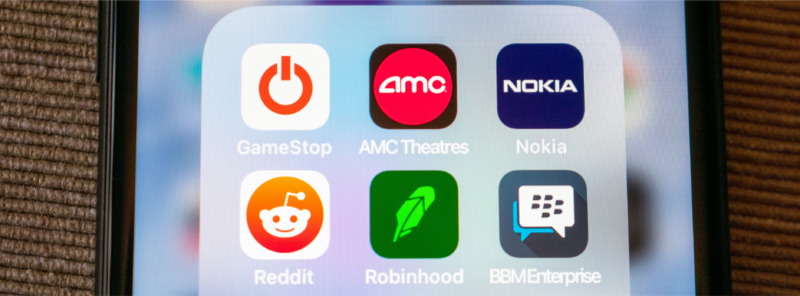The first quarter of the year was an eventful one. With protestors rioting in the Capitol, a new administration taking over, and a world trying to recover from COVID-19, there was no shortage of news in Q1. One of the biggest headlines was the emergence of “meme” stocks after a frenzy of retail investors banded together to drive up prices of specific companies in mid-January and February. Through the use of Reddit and other social media platforms, retail investors were able to actively target some of the most highly shorted stocks in the markets to try to force a short squeeze on hedge funds.
This led to several companies seeing their stock prices rise dramatically, some as much as several hundred percentage points, and trading volumes soaring well above normal. At one point, Robinhood, the online brokerage firm often used by retail investors, had to shut down or limit trading on certain days for certain stocks due to the massive order flow they were receiving. Now that the first quarter 13F filings are publicly available, we took a look at some of the major shareholder movements we saw in some of the biggest meme stocks including GameStop (GME), AMC Entertainment Holdings (AMC), and Blackberry (BB).
GameStop Corp.
Probably the most well-known of the meme stocks, GameStop started the frenzy after its stock rallied from under $20/share to $483/share at its highest. The company’s fundamentals had been deteriorating for several years now, but some savvy investors realized that their short interest as a percentage of float had ballooned to over 100%.
Once retail investors started piling into the stock, a massive short squeeze ensued which further enticed more investors to buy-in. The volatility was so extreme at times that shares were halted several times a day over the week. Although the stock eventually pulled back to the $40 range in mid-February, shares have once again rallied in recent weeks and are back above the $200 level.
Not surprisingly, most of the top institutional investors liquidated their positions over the quarter. Even noteworthy long-term investors like Fidelity and Dimensional Fund Advisors that tend to exhibit very low turnover rates in their portfolios sold almost their entire positions in the stock. The other top hedge fund owners in the stock completely sold out as well including Senvest Management (-5M), Maverick Capital (-4.7M), and Permit Capital (-1.1M). D.E. Shaw, another well-known hedge fund, sold 2.8M shares as well and held only 40K shares at the end of the quarter. Overall the top ten sellers over the quarter accounted for over 34M shares of selling or roughly 48% of total shares outstanding.
Meanwhile, if you look at the buying activity from the institutional community, it was almost non-existent. There were a couple firms like Arrowstreet Capital and RBF Capital that initiated positions, but they were very small in comparison and not much conviction behind them. The rest of the shares were absorbed by retail investors and hedge funds that covered their shorts. As a result, GameStop’s shareholder composition has been absolutely devastated with only Index investors remaining among the top holders. With the larger, long-term investors sitting on the sidelines it would not be surprising to continue to see the meme stocks experience major volatility with short-term hedge funds and retail investors pushing the share price around.
AMC Entertainment Holdings
AMC Entertainment Holdings, like many firms, was hit hard in 2020 during the global pandemic. With most movie theatres closed due to COVID-19 and many studios delaying the release of big blockbuster films, AMC wasn’t able to generate much revenue and was burning through cash quickly. Towards the end of the year, the company was burning through over $100 million per month and was running low on cash reserves. With the company desperate to find liquidity and shore up its balance sheet of the meme stocks, many investors began to short the stock in anticipation of a potential bankruptcy. The stock price had steadily drifted lower from $7 in early September to just $2 by the end of December.
Eventually, the stock started to recover slightly in January as the company was able to free up some cash to keep operations going. However, once retail investors started to focus their attention on AMC the stock spiked from $2.98 on January 21 to over $20 just six days later on January 27. Like GameStop, shares of AMC saw extreme volatility and trading volume and were halted several times. The stock eventually fell back down to the $5 range in mid-February but has surged in the last few weeks back to $16.
Similar to meme stocks GameStop, most of the top institutional holders liquidated their positions and took the profits. Mudrick Capital Management was the firm’s top shareholder and it completely divested its 9.1M share position. Mittleman Investment Management is a small deep-value investor that was the fourth largest holder with 2.1M shares before selling out completely as well. Many of the other largest shareholders had already sold out in the previous quarter when the company was nearing bankruptcy, so there were not that many large institutional investors left in the stock.
Unlike the GameStop situation, AMC actually saw massive buying over the quarter on behalf of index investors. Due to the meteoric rise in the stock price, it seems that many funds were forced to buy more shares and assign a higher weighting to the stock. Vanguard alone bought roughly 29.5M shares. Most of that came through its Vanguard Total Stock Market Index Fund, which added 10M in March, while the Vanguard Small-Cap Index Fund also picked up just shy of 9M shares. Other index investors also followed suit including BlackRock Fund Advisors, Invesco Capital, and State Street Global Advisors. Some of BlackRock’s more actively managed arms also contributed to the buy-side but were not as aggressive.
Overall though the activity in Q1 leaves AMC’s shareholder composition in a precarious position. Most of the larger firms have already liquidated and the bulk of the shares are now heavily concentrated among index and retail investors. If AMC’s stock price were to revert back to 2020 levels, you may possibly see the index funds reverse course and liquidate those positions again. With retail investors continuing to cause volatility in the stock, it may be difficult to entice large, long-term holders to take meaningful positions into the story.
Blackberry
Similar to GameStop and AMC, Blackberry has been a well-known company with a stock price that has been trending downward for the last few years. Shares had been hovering within the $4 to $5 range for most of 2020 before seeing a slight push higher to $6 – $8 in December. In January things started to escalate with retail investors bidding the stock up to almost $30 at one point. After all the hype shares eventually pulled back and settled in a much tighter range near $9 but still well above 2020 levels.
Some of Blackberry’s top holders managed to stay in the stock, unlike the previous two examples we saw. Among the top active holders coming into the year, PRIMECAP Management sold off roughly 25% or 15M shares of its position, but still has over 44M shares remaining. Hamblin Watsa Investment Counsel, a Toronto-based investor, did not make any changes to its 47M share position and actually moved up to the number-one holder of the meme stocks.
Khan Brothers Advisors, a small GARP investor, did cut its position by 2M shares but still remains among the top 10 shareholders of Blackberry. Other top shareholders did sell out, however, including large names like Arrowstreet Capital (-8.5M), Wells Capital Management (-7M) and Harris Associate (-4.8M).
Interestingly, larger institutions did show signs of life on the buy-side for Blackberry. Allianz Global Investors made a massive initiation of 27M shares, launching into the top three holders of the firm. Some higher turnover hedge funds also bought into the story including Citadel Advisors, Islet Management, and Voloridge Investment Management.
It is worth noting, however, that these three investors tend to be higher-turnover and short-term traders at times so it is possible they could just be trading around the volatility. Either way, Blackberry came away with a shareholder base much more intact with a mix of different investor types remaining at the end of the quarter.
Conclusion
The emergence of these meme stocks led to some historic events in Q1’21 that have demonstrated the power of retail inventors and forced institutional investors to rethink their strategies. While these companies have benefited from their rising stock prices in recent months, there have been meaningful consequences that have followed. All three stocks have continued to experience elevated volatility and rapid price swings in recent months.
In addition, these firms have seen the quality of their shareholder bases diminish as most of their top holders sold out. It will also take time for new investors to reassess their new stories and buy back in. It is unclear how these stories will play out, but we will likely continue to see headlines centered around them for the foreseeable future. Learn more about the impact experienced by these meme stocks by reading Investor Relations is No Game.


